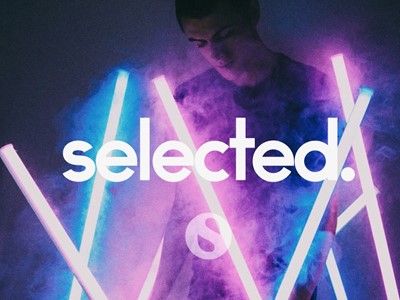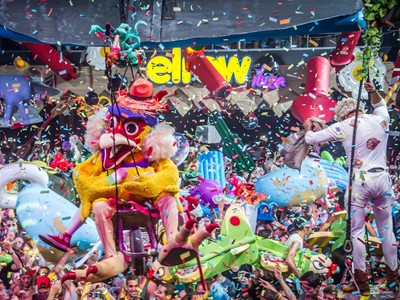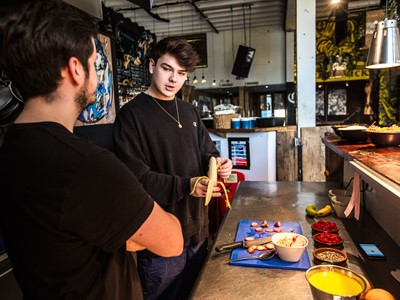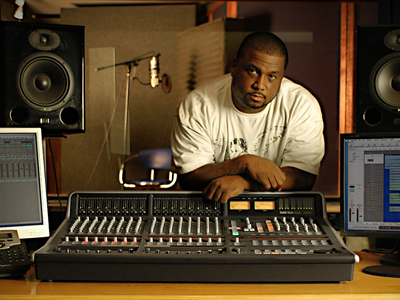Managing Editor
Uroš Umek has a story unlike any other DJ in the scene. Born in Slovenia in 1976 when it was part of former Yugoslavia, Umek's upbringing was about as culturally different from Studio 54 and The Paradise Garage as you could get. After being introduced to a electronic music as a teenager, he went on to become one of the biggest techno DJs in the world, and one of Slovenia's biggest musical exports.
We're about to go on tour with UMEK as he plays dates in Bosnia and Serbia, but before we hit the road we sat down to talk about goring up behind the Iron Curtain and throwing raves in a warzone.
You grew up ‘Behind The Iron Curtain' what was that like?
Not so bad actually. Our Coca Cola, chocolates and ketchup didn’t taste the same as in the west, but I’ve gained an additional 20 kilos since the fall of the iron curtain, so I’m thinking that wasn't that bad after all! I grew up in the 80s and I remember listening to the then popular bands such as Human League, who were using a lot of electronic elements in their mainstream productions. But then, in the early 90s, the borders fell and a whole generation suddenly became exposed to many new sounds. It was just the right time when I discovered this new electronic music coming mostly from Germany. I was a rebelling teenager and found my calling in rave culture. First as a kid going to raves in Munich, but I decided quite quickly to get involved as a DJ. I quit school and my basketball training and focused on my only goal - to become this big international DJ figure.
How did you go about becoming this international DJ figure?
In the beginning it was really hard, as the scene in Slovenia was literally non-existent until the 90s when I discovered 'Cool Night' show hosted by Aldo Ivancic, MC Brane and Primoz Pecovnik on Radio Student. They played all kind of electronic music, from trance, rave, techno, EBM, some really dark stuff. Soon after they started their nights in the student club, K4. I became regular and after a while I was introduced to artists such as Jure Havlicek, who invited me into his studio and show me how his music is created. At that time, I was taking my first steps as a producer, using an 8-bit Screen Tracker with 4 mono channels and sampling from tape cassettes. When Jure showed me his Roland 808 and 909, and all other legendary machines I knew that was exactly what I wanted to do with my life. As there was no copyright legislature in Slovenia at that time I started selling pirate cassettes with my friends and soon gathered enough money to buy my first proper sampler. We bought it from Random Logic and one half of that project, Gregor Zemljic, later did a lot of mastering on my music.
Do you have fond memories of those days?
Looking back now I must say those early pioneer years were a very special time. I’m not sure if someone from England can truly comprehend that as you’ve always had a strong music scene, but we’ve had no infrastructure for electronic music at the beginning (no knowledge of doing music, running labels, no pirate radio stations, no magazines, no information, no venues, the nearest records shops were hundreds of kilometers away in Milan, Vienna and Munich. But because of that we were able to build the scene on our own terms, the way we liked it. Those were really special times.
How has Slovenia influenced your music taste?
Mostly in the way that I didn’t find anything of my taste in Slovenian production. I learned to become very resourceful early in my life to get my hands on some music from the west, especially Germany. For me it was a big deal anytime I got a tape cassette or record with electronic music. And when my friend’s parents bought satellite TV we were glued to regular and pirate radio stations from the UK and Germany.
You used to run illegal raves, how did you go about finding a site, what were the risks, what was the biggest rave you threw?
Actually our raves were more or less legal. In the early days they were parties for a few hundred people at most, but we did festivals of up to 30,000 people when the scene really grew and got more mainstream. For us the problem wasn't like in the West where the event markets were controlled and a new scene had to establish itself in alternative venues under the suppression of authorities because of drugs, tax evasion or violence. For us, it was a challenge to even do things legally, as the scene was virtually non-existent. We had to develop it all from scratch by organising club events, throwing special parties, putting together fanzines, do radio shows and record mixtapes to get people exited for these new sounds.
Where did you throw these early parties?
We did parties in firemen’s halls, sports halls, as well as open airs. For the open airs, we’d rent a small truck, put the sound system, lights, decks and aggregate on it and that was the stage. We’d set up in a field, which we'd rent out for the night. The only conflicts we’ve had with the police was fighting to let us play music past 2AM. They always came to shut us down, even though we’d always have permits to operate late. Though there were also more bizarre experiences, such as an article in a national newspaper after one of our little raves in the countryside. They cited a local politician stating the cows in the nearby village have stopped lactating due to our loud rave music.
Do you have any wild stories from the illegal rave days?
Not really but I have experienced more hardcore things that could serve as the plot of a Hollywood movie, like Rock The Casbah. In the time of wars in Croatia and Bosnia, which were in our backyard, we toured the region regularly and it was not always safe to travel to the gig and back, but we wanted to do it for the people there. For example we had to travel by ferries from island to island to get to the cities in Dalmatia only 30 or 50 kilometres from the warzone. We couln't drive on the mainland and it was not pleasant hearing explosions in the distance or army jets flying over our heads on the way there and back. I was still a teenager then and luckily my mum didn’t know what I was doing or she would not have let me go. I can’t remember now where I told her I was going, but I didn’t tell her that I’m going to play records beside a warzone, that's for sure!
What is your proudest career moment?
A very special thing was when the President of the state sent me a formal letter wishing me all the best for my birthday. That was a nice confirmation for my mother that she did a good job supporting me in my ambitions through all these years. My personal satisfaction is that I’m still where I am after all this time. That I enjoy doing this just as much as the first day I’ve stepped into a DJ booth. That I’m still progressing in my career and that I still feel I have so much to do and say with my work.
You’re gearing up for a Ministry of Sound tour of Serbia and Bosnia, what have you got in store for each date?
I’ll have to test some fresh productions I’ve done in the last couple of months, but as usually expect a fingerprint Umek sound, which is all about building the energy on the dance floor with a mixture of my own releases, remixes, edits and unreleased tracks, latest releases on my 1606 label as well as music I’m presenting in my Behind the Iron Curtain radio show.
Do you have any experience of Ministry of Sound? What do you think of the brand?
Sure I do! I’ve played many times at Ministry of Sound in London and also for some other MoS parties and it was always a nice experience with great support from the audience on the dance floor. Ministry of Sound is a premium brand in electronic music with a long and deep presence in the scene, heavily involved in parties as well as music business. I’ve played a lot of music from their catalogue and they’ve featured some of my music on their compilations such as The Annual in the past as well, so I feel close to the MoS brand.
How do parties in Eastern Europe differ from Western Europe?
There’s not that much of a difference between the energy that I get from the dance floor when I play in Germany, Brazil or Poland. There is a bit more of an excitement in the USA as their scene is still quite young and of course I can feel a bit more excitement when I play in my home region, Serbia and Bosnia included, because of a personal connections. I’m not playing here very often and they still perceive me as their domestic artist and somebody that supports their young talents with the label and radio show as well.
UMEK will be playing Drugstore in Serbia on 8th April, get your ticket here.















